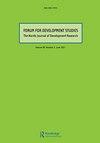Norwegian Development Aid: A Paradigm Shift in the Making?
IF 1.1
Q3 DEVELOPMENT STUDIES
引用次数: 1
Abstract
Abstract Norway has remained committed to allocating one percent of its Gross National Income in developing aid. Poverty reduction has also stayed as an overarching objective for the aid budget. The commitment to these traditional pillars in Norwegian aid is also accompanied by major changes: reduced focus on partner countries and bilateral aid and an expanding emphasis on supporting global action, the rise of a flourishing number of new thematic priorities and delivery through multilateral channels. This article maps the evolving continuities and changes in Norwegian development aid since the early 1990s. It relies on an analytical framework based on Peter Halls work on paradigm shifts and his distinction between first, second and third order changes. The explanation for the evolving profile of Norwegian aid is found in a combination of domestic driving forces. Based on Matthew Wood’s concepts of puzzling and powering dynamics behind paradigm shifts the article identifies the forces behind evolving aid policies. One is depolitisation behind Norwegian aid – a broad political and popular support and consensus but limited debate leaving much space for foreign policy and self-interest to shape implementation and selection of instruments. A second is linked to a change in the policy arena and the growing dominance of the Ministry of Foreign Affairs. This has led to a multifaceted and fragmented aid profile allowing various dimensions of development aid policies to be shaped by different interests and priorities. It has not yet reached a stage where we can identify a major break with the past and a radical policy transformation. The new focus on climate issues and migration may have the potential to change that and give self-interests a stronger influence over long-term development aid and its objectives. Changes in coalition politics may have the potential to change the majority behind the one percent target and the commitment to poverty reduction.挪威发展援助:正在形成的模式转变?
挪威一直致力于将其国民总收入的1%用于发展援助。减少贫困也一直是援助预算的首要目标。挪威援助中对这些传统支柱的承诺也伴随着重大变化:减少对伙伴国家和双边援助的关注,扩大对支持全球行动的重视,大量新的主题优先事项的兴起,以及通过多边渠道提供援助。本文描绘了自20世纪90年代初以来挪威发展援助的演变连续性和变化。它依赖于一个分析框架,该框架基于Peter hall关于范式转换的研究以及他对一、二、三阶变化的区分。对挪威援助状况演变的解释是国内驱动力的结合。根据马修·伍德关于范式转变背后令人费解和强大的动力的概念,本文确定了不断发展的援助政策背后的力量。一个是挪威援助背后的去政治化——广泛的政治和民众支持和共识,但有限的辩论,给外交政策和自身利益留下了很大的空间,以影响工具的实施和选择。第二个原因与政策领域的变化以及外交部日益增强的主导地位有关。这导致了多方面和支离破碎的援助概况,使发展援助政策的各个方面受到不同利益和优先事项的影响。它还没有达到一个阶段,我们可以确定与过去的重大决裂和激进的政策转变。对气候问题和移民问题的新关注可能会改变这种情况,使自身利益对长期发展援助及其目标产生更大的影响。联盟政治的变化可能会改变支持1%目标和减少贫困承诺的大多数人。
本文章由计算机程序翻译,如有差异,请以英文原文为准。
求助全文
约1分钟内获得全文
求助全文
来源期刊

FORUM FOR DEVELOPMENT STUDIES
DEVELOPMENT STUDIES-
CiteScore
1.80
自引率
14.30%
发文量
24
期刊介绍:
Forum for Development Studies was established in 1974, and soon became the leading Norwegian journal for development research. While this position has been consolidated, Forum has gradually become an international journal, with its main constituency in the Nordic countries. The journal is owned by the Norwegian Institute of International Affairs (NUPI) and the Norwegian Association for Development Research. Forum aims to be a platform for development research broadly defined – including the social sciences, economics, history and law. All articles are double-blind peer-reviewed. In order to maintain the journal as a meeting place for different disciplines, we encourage authors to communicate across disciplinary boundaries. Contributions that limit the use of exclusive terminology and frame the questions explored in ways that are accessible to the whole range of the Journal''s readership will be given priority.
 求助内容:
求助内容: 应助结果提醒方式:
应助结果提醒方式:


